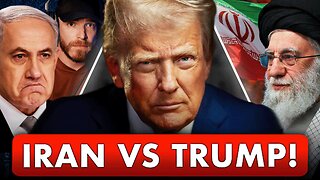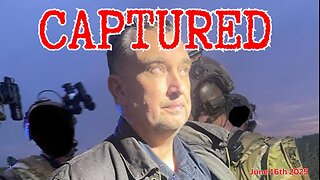Premium Only Content

Listen to what the enemy says about China
Video: Listen to what the enemy says about China. After the war, 21 American prisoners of war and 1 British prisoner of war, including logistics soldier Winners, chose not to return to the country屈穎妍視頻: 聽聽敵人怎麼說中國. 21名美國戰俘及1名英國戰俘在戰爭結束後,竟然選擇不歸國,而是跟隨志願軍回中國定居,當中包括後勤兵溫納瑞斯.
瀋陽又迎來新一批志願軍遺骸,兩架殲20戰機護航,機場以「過水門」的最高禮遇迎接,全市以最隆重的儀式守候,把這第十批共25名在韓的中國人民志願軍烈士遺骸接回家。
70多年前的浴血奮戰,相繼有197653名抗美援朝烈士魂斷戰場。近年先後有十批共938位在韓中國人民志願軍烈士遺骸回到祖國,長眠於瀋陽抗美援朝烈士陵園。
戰爭的焦點,從來都落在英雄身上,抗美援朝的犧牲故事更是震撼的、動人心弦的。
但今天我寫這筆,卻是戰場上最被忽略、最少人提及的角色——戰俘,聽聽敵人怎麼說,其實也可讓我們對志願軍及國家多一分瞭解及崇敬。
抗美援朝戰俘之一、英國皇家陸軍第29旅格羅斯特營營長卡恩斯中校在戰爭結束回國後曾如此評價:「中國人改寫了世界戰俘史!」
是的,如果你看看這場戰事中被我國俘虜的西方軍人在戰俘營的待遇,就明白為什麼敵人會對這一窮二白的國家肅然起敬。
1952年11月,志願軍戰俘營內舉辦了一場特殊「奧運會」,來自十多個國家的幾百名俘虜一起參與,美國人還在當中拿了多枚獎牌。
沒有殺戮虐待,只有強身健體,戰俘奧運會體現的正是中國人的善良與和平。
讀過抗美援朝歷史都知道,當年志願軍的資源是如何匱乏,但中國人從來都是刻苦自己、善待別人,志願軍在吃土豆玉米鹹菜的時候,原來戰俘營裡的俘虜卻能吃肉罐頭和飲牛奶。一名被俘時瘦骨嶙峋的黑人俘虜,獲釋時體重竟增了17磅。
美國後勤兵溫納瑞斯說,一入營,志願軍會給每人派發一支鋼筆、一疊信紙和一個信封,讓他們寫信回家報平安,並保證一定幫會把信寄出。
有個荷蘭戰俘是個文盲,別人寫信回家,他因為不識字,呆坐一角默默流淚。
有一天,這荷蘭兵被志願軍帶走了,大家以為他會遭遇不測。沒想到,幾個月後,他完好無缺回來,而且還學會寫字。
原來,志願軍知道他情況,找遍戰俘營,找來一個會荷蘭語的軍官給他上了半年識字課,回來的這位荷蘭兵不僅識字,還能寫簡單句子。
戰俘回憶說,志願軍都叫他們做「朋友」而不是「外國佬」,更不會有侮辱稱呼。營內無任何體罰打罵,即使戰俘有違規行為,只是關閉一周予以處罰,在一般戰俘營出現的毒打虐待,在這裡是不會發生的。
美國士兵溫納瑞斯在回憶錄曾這樣寫:「我在戰俘營度過了兩年零八個月的時間,那段生活我非常快樂,我深信這支軍隊是一支文明的軍隊、仁慈的軍隊和得人心的軍隊。」
正因如此,一個奇怪現象發生了。
21名美國戰俘及1名英國戰俘在戰爭結束後,竟然選擇不歸國,而是跟隨志願軍回中國定居,當中包括後勤兵溫納瑞斯。
消息一出,國際譁然,大家都認為這些戰俘被中國人以特殊方式洗腦了,否則怎會背棄國家及親人,去貧窮的中國受罪?
在戰俘營生活過就明白為什麼,當中的溫納瑞斯更是表表者,他不單留在中國娶妻生子,更一直活到終老,最後葬在中國。
聯合國軍總司令、美國陸軍上將李奇微在回憶錄寫道:「中國人民志願軍是最兇狠的鬥士,也是最文明的敵人。」
跟中國人交過手就會明白,誰才是真正和平之師。
Chinese to English via Google Translate
Shenyang welcomed a new batch of volunteer remains, escorted by two J-20 fighter planes. The airport greeted them with the highest courtesy of "passing through the water gate", and the city waited with the most solemn ceremony. The tenth batch of remains of 25 Chinese People's Volunteer Army martyrs in South Korea were brought home.
In the bloody battle more than 70 years ago, 197,653 martyrs to resist U.S. aggression and aid Korea died on the battlefield. In recent years, the remains of 938 Chinese People’s Volunteer Army martyrs in ten batches in South Korea have been returned to the motherland and laid to rest at the Shenyang Cemetery of Martyrs to Resist U.S. Aggression and Aid Korea.
The focus of war has always been on the heroes, and the stories of sacrifice in the war to resist U.S. aggression and aid Korea are even more shocking and touching.
But what I write today is about the most ignored and least mentioned role on the battlefield - prisoners of war. Listening to what the enemy has to say can actually give us a better understanding and respect for the volunteers and the country.
Lieutenant Colonel Kearns, one of the prisoners of war to resist the U.S. and aid Korea and the commander of the Gloucester Battalion of the 29th Brigade of the Royal Army, once commented after returning to China at the end of the war: "The Chinese have rewritten the history of prisoners of war in the world!"
Yes, if you look at the treatment of the Western soldiers captured by our country in the prisoner-of-war camps during this war, you will understand why the enemy is in awe of this poor country.
In November 1952, a special "Olympic Games" was held in a volunteer prisoner-of-war camp. Hundreds of prisoners from more than a dozen countries participated, and Americans also won many medals.
There is no killing and abuse, only physical fitness. The POW Olympic Games embodies the kindness and peace of the Chinese people.
Anyone who has read the history of the War to Resist U.S. Aggression and Aid Korea knows how scarce the resources of the Volunteer Army were at that time, but the Chinese have always been hard on themselves and kind to others. While the Volunteer Army was eating potatoes, corn, and pickles, it turned out that the prisoners in the prison camp were able to eat canned meat and drink milk. . One black prisoner, who was skinny when captured, gained 17 pounds when he was released.
American logistics soldier Wenneris said that upon entering the camp, the volunteers will distribute a pen, a stack of letter paper and an envelope to each person, asking them to write home to report that they are safe, and promise to send the letter.
There was a Dutch prisoner of war who was illiterate. When others wrote home, he sat in a corner and cried silently because he was illiterate.
One day, the Dutch soldier was taken away by the volunteers. Everyone thought something bad would happen to him. Unexpectedly, a few months later, he came back intact and learned to write.
It turned out that the Volunteer Army knew about his situation, searched the prisoner of war camp, and found an officer who could speak Dutch to give him a literacy class for half a year. The Dutch soldier who came back was not only literate, but could also write simple sentences.
Prisoners of war recalled that the volunteers called them "friends" instead of "gringos", let alone insulting names. There is no corporal punishment or scolding in the camp. Even if prisoners of war violate the rules, they will only be closed for a week and punished. The severe beatings and abuse that occur in ordinary prisoner of war camps will not occur here.
The American soldier Winners once wrote in his memoirs: "I spent two years and eight months in a prisoner of war camp. I was very happy during that period. I firmly believe that this army is a civilized and benevolent army. An army and a popular army.”
Because of this, a strange phenomenon occurred.
After the war, 21 American prisoners of war and 1 British prisoner of war, including logistics soldier Winners, chose not to return to the country, but to follow the volunteers to settle in China.
As soon as the news came out, there was an international uproar. Everyone believed that these prisoners of war had been brainwashed by the Chinese in a special way. Otherwise, how could they abandon their country and relatives and go to poor China to suffer?
If you have lived in a prisoner of war camp, you will understand why. Among them, Wenneris is an example. He not only stayed in China to marry a wife and have children, but also lived until his death and was finally buried in China.
Commander-in-Chief of the United Nations and U.S. Army General Ridgway wrote in his memoirs: "The Chinese People's Volunteers are the fiercest fighters and the most civilized enemies."
Once you have fought against the Chinese, you will understand who is the true master of peace.
-
 LIVE
LIVE
Caleb Hammer
30 minutes agoI Tried Saving Their Relationship, But She's A B*tch | Financial Audit
128 watching -
 1:09:17
1:09:17
Dear America
2 hours agoDid Trump Just Open The Door To War?! + NEW INFO On MN Assassination!!
64.6K71 -
 LIVE
LIVE
GloryJean
1 hour agoA GOOD week ALWAYS Starts with Good Monday, Let's VIBE 😎
23 watching -
 LIVE
LIVE
Badlands Media
8 hours agoBadlands Daily: June 16, 2025
5,404 watching -
![🔴[LIVE TRADING] Stocks Bounce, Oil Falls & Breaking Market News || The MK Show](https://1a-1791.com/video/fww1/5f/s8/1/5/4/P/T/54PTy.0kob.1-small-LIVE-TRADING-Stocks-Bounce-.jpg) LIVE
LIVE
Matt Kohrs
9 hours ago🔴[LIVE TRADING] Stocks Bounce, Oil Falls & Breaking Market News || The MK Show
970 watching -
 LIVE
LIVE
Wendy Bell Radio
6 hours agoCAPTURED
9,690 watching -
 4:36
4:36
Sugar Spun Run
3 hours ago $0.10 earnedPink Lemonade
6.94K1 -
 2:14:58
2:14:58
Welcome to the Rebellion Podcast
22 hours ago $2.24 earnedHow was YOUR Weekend - WTTR Podcast Live 6/16
26.4K -
 1:12:59
1:12:59
Game On!
16 hours ago $1.35 earnedNBA Finals Game 5 LOCK OF THE CENTURY!
23.2K1 -
 2:03:44
2:03:44
BEK TV
4 hours agoTrent Loos in the Morning 6/16/2025
17.9K